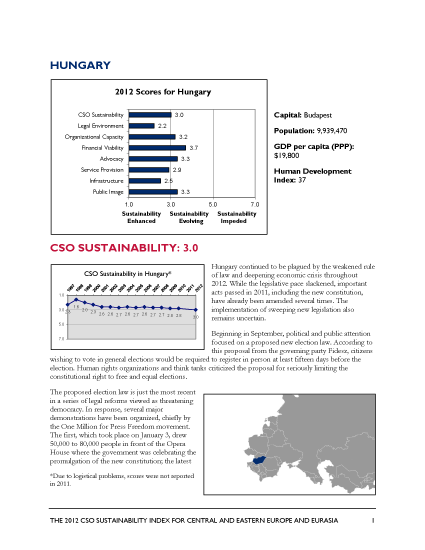CSO SUSTAINABILITY: 3.0
Hungary continued to be plagued by the weakened rule of law and deepening economic crisis throughout 2012. While the legislative pace slackened, important acts passed in 2011, including the new constitution, have already been amended several times. The implementation of sweeping new legislation also remains uncertain.
Beginning in September, political and public attention focused on a proposed new election law. According to this proposal from the governing party Fidesz, citizens wishing to vote in general elections would be required to register in person at least fifteen days before the election. Human rights organizations and think tanks criticized the proposal for seriously limiting the constitutional right to free and equal elections.
The proposed election law is just the most recent in a series of legal reforms viewed as threatening democracy. In response, several major demonstrations have been organized, chiefly by the One Million for Press Freedom movement.
The first, which took place on January 3, drew 50,000 to 80,000 people in front of the Opera House where the government was celebrating the promulgation of the new constitution; the latest was on October 23, a national holiday, with approximately the same turnout. Despite earlier optimism, the economy plunged into a recession: according to forecasts, the GDP decreased by 1.2 percent in 2012, and may only grow by 1 percent in 2013. While the government entered into negotiations with the EU and IMF on a bailout package, it has been reluctant to initiate much-needed structural reforms, e.g. to the pension system, and has attempted to patch the deficit by introducing new taxes, including on telecommunications and banking transactions.
Standards of living are deteriorating and the proportion of people living in deep poverty is increasing. The unemployment rate is above 10 percent and inflation is expected to be around 6 percent in 2013. Social and ethnic tensions are rising, as is emigration, which has reached a level not seen in the last twenty years. Political apathy is also high, with 54 percent of respondents in polls now saying that they will not vote in the next election.
Civil society has been affected by the deteriorating conditions in the country. Anecdotal evidence indicates that most CSOs consider their conditions worse in all respects, a significant change from the stable or improving situation of the previous decade. The crisis also revealed weaknesses that were not apparent earlier – especially with respect to advocacy capacity – that may have resulted in overly optimistic scores in previous years.
According to the latest data from the Central Statistical Office, in 2011 there continued to be approximately 65,000 CSOs registered in Hungary, including 23,500 foundations and 41,500 associations. The majority of foundations work in education (32 percent), social services (16 percent), and culture (14 percent), while leisure and hobby (25 percent), sport (16 percent), and culture (12 percent) are the predominant activities among associations.








Comment
Make a general inquiry or suggest an improvement.